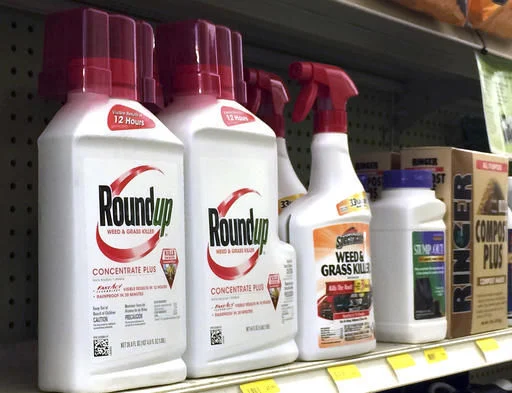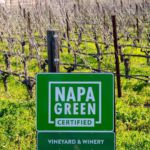Despite diametrically opposed studies on its safety, Napa Green recently announced that it will require members to phase out the use of Roundup and other synthetic herbicides by 2026 and 2028, respectively.
On Thursday, the nonprofit focusing on vineyard and winery sustainability will hold a town hall and panel with industry experts to discuss the decision to move toward herbicide-free weed management practices in the coming years.
“We are the first program globally to redevelop our vineyard standards to focus on climate action and regenerative farming and social equity. We set an incredibly high bar,” executive director Anna Brittain said.
In 2021, the nonprofit convened a Pesticide Working Group to revise its Vineyard Certification Standards, she said. At the time, the organization chose not to require that vineyards be herbicide-free, but they did designate a new “gold level” standard specifically for organic and herbicide-free growers.
It also introduced requirements for all growers to limit herbicide use. Brittain said the new standards called on growers to lower herbicide use by 5% each year, and limit when and where they applied herbicides to limit runoff potential.
The working group has continued to meet biannually in the two years since the revision, and this year the group reached a majority conclusion that synthetic herbicides needed to be phased out. This will begin with Roundup, but in 2028, it will also include common alternatives like Lifeline and Finale XL, which uses glufosinate-ammonium as its active ingredient.
Brittain said that this decision was not an easy one. Getting rid of herbicides requires a “systematic change to farming” on the part of growers who have relied on them for weed management. Other methods include more hand weeding, which means more paid hours of manual labor. Alternatively, switching to mechanical methods of weed removal, like tractors and plows, require a fairly large monetary investment, and generally take longer.
Additionally, 37% of Napa Green’s current members — as well as those in the process of getting certification — still use synthetic herbicides, and Brittain believes there is a chance some members will leave the organization with this change.
For Napa Green, the pros outweigh the cons.
Synthetic herbicides are “reducing diversity in the soil, it’s reducing the health of the microbiome, and all the microbes and the fungal networks in the soil when you’re applying this chemical to the soil,” she said. “From a soil health standpoint, we felt that was pretty unequivocal. We’re very focused on regenerative agriculture and it’s hard to say you’re working on regenerative agriculture if you’re not regenerating soil health.”
Adding to the confusion and controversy, two major agencies focused on cancer and health have come to completely different conclusions when it comes to glyphosate.
The substance has been deemed “probably carcinogenic to humans” by the International Agency for Research on Cancer. It has also been linked to the development of non-Hodgkin’s lymphoma after long-term, repeated exposure and threatened species including the monarch butterfly and honeybees, according to Napa Green.
However, the U.S. Environmental Protection Agency has said “there are no risks of concern to human health when glyphosate is used in accordance with its current label. EPA also found that glyphosate is unlikely to be a human carcinogen.”
And Bayer, the current producer of Roundup (which was brought to market by Monsanto in 1974), states that the product can be used safely.
“Glyphosate and Roundup are among the most thoroughly studied products of their kind, which is a major reason why farmers around the world continue to rely on these products,” a Bayer spokesperson said via email. “For 50 years, leading health regulators around the world have repeatedly concluded that glyphosate-based products like Roundup can be used safely as directed.”
Molly Hodgins, a viticulture professor at Napa Valley College, said that whether or not growers should move away from herbicides entirely isn’t clear.
“I think it’s a tough call,” Hodgins said. “The soil is generally healthier when it’s kept in an organic state, which is having weeds. There’s more organic matter in a soil that is allowed to have weeds grow. But managing undervine weeds with mowing is more expensive and it is more work, so I think there is room for some herbicides in a sustainable program.”
But worries about the health effects of Roundup and other herbicides like it are why Randle Johnson, a longtime Napa grape grower, decided to stop using all weed killers in 2019.
He’s been a winemaker in Napa for almost 50 years, and remembers when Roundup was first introduced to growers.
“I was around when Roundup hit the market and it was viewed as a silver bullet. People cheered and clapped,” he said. “At the very beginning, it was felt that it was so benign you could ingest it.”
He used Roundup in the vineyards he worked in until 2018, when he stumbled upon a medical infomercial warning of the herbicide’s negative effects.
“I quit using Roundup in my own vineyard three to four years ago,” Johnson said. “But when chemicals are phased out, farmers are going to ask, ‘What can I use instead?’”
There are mechanical methods that vineyards can use, like the French Plow and other tractors, to take out weeds between vines. Johnson also said that hand-farming is an option. But for him, both of these methods turned out to be a lot more expensive and time-consuming than using herbicides.
Brittain said that Napa Green is planning to provide at least two training workshops during the first quarter of 2024 to teach members about non-herbicide weed management options.
The nonprofit has also raised $60,000 to match funds for members’ sustainability and climate action efforts. Brittain said that growers making changes to phase out herbicides will be able to apply for those funds in the new year.
For a small number of vineyards that are unable to entirely phase out herbicides, Brittain said that some variances might be granted. The idea of variances has been controversial among Napans, but Brittain said that the number of these exceptions will be small.
“There’s been a take of like, ‘You’re just going to give anyone a pass,’ which is not going to be the case,” Brittain said. “Those variances are going to be very limited.”
“This industry is extremely narrow margins and we do anticipate there will probably be a handful of growers where they really can show, ‘With my level of slopes and terraces or the amount of rocks in my soil, there isn’t other equipment I can use,’ or ‘The labor is really absolutely cost-prohibitive,’ and we’re going to be looking at that very carefully,” she continued.
She said that a peer-review committee will be assembled to assess these variance requests on a case-by-case basis. The committee will likely include Napa Green’s vineyard program manager along with volunteers, both from vineyards that do use herbicides and those that do not.
Brittain said case studies conducted by Napa Green, available in the group’s weed management toolkit, show that over time, moving away from herbicides can reduce expenditures, and sometimes lead to a premium on the price of grapes in the long run.
At Thursday evening’s town hall, she expects the majority of the conversation to revolve around how to make the transition period manageable for current and potential new members of Napa Green.
The event will take place from 4:30 to 6:30 p.m. at St. Supéry Estate Vineyards & Winery, at 8440 St. Helena Highway (Highway 29) in Rutherford. To RSVP, visit napagreen.org/toolkit.



